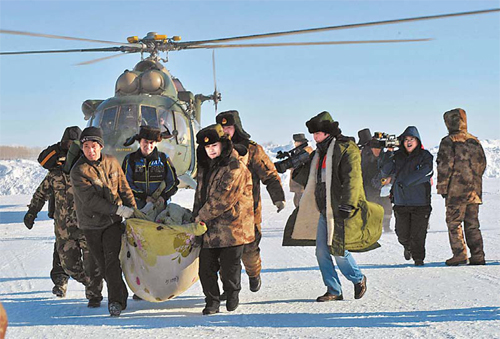
Rescue staff evacuate illegal gold miner suspect, who had been seriously frozen in a mountainous region in Altay, the Xinjiang Uygur autonomous region, on Thursday.[China Daily/Liu Xin]
|
|
Premier Wen Jiabao has promised to take more effective measures to help people through the worst winter in the Xinjiang Uygur autonomous region in six decades, after visiting two worst-hit areas over the weekend, the State Council General Office said yesterday.
Wen visited the Altay and Tacheng areas, which have been suffering from extreme cold and continuous blizzards since December, causing road closures and blocking essential supplies from reaching people and livestock.
"The focus of our work is to maintain people's livelihoods, agriculture and animal husbandry operations, supplies of commodities and transport services."
At a Kazak village in the suburbs of Altay city in Xinjiang, Wen instructed local officials to speed up transport of fodder from farming regions that were less affected by the weather when Zhumashi, a Kazak shepherd, told the premier that his fodder reserves were running low.
The government will offer subsidies and provide discounted loans for shepherds, as well as continue assistance into the spring, Wen said.
"The government has offered a lot of help. We will also try our best," Shihake, another villager in his 70s, told Wen.
Wen's next stop was a shepherd settlement in Tacheng, another region severely affected by the weather. He also visited people evacuated from blizzard-hit regions and farmers whose farms were damaged in the storms in Tacheng.
The extreme snow conditions in Xinjiang had claimed 13 lives by yesterday, according to the regional bureau of civil affairs.
The bureau said the blizzard and freezing temperatures that swept the northern part of Xinjiang, particularly Altay and Tacheng, had left another 1,168 people ill and injured.
Almost 1.42 million people were affected by the weather, and of these, about 162,000 have been evacuated. So far, more than 150 million yuan ($22 million) has been put into disaster relief work by the central and regional governments.
The central government yesterday allocated an additional 14 million yuan to Xinjiang as emergency relief funds.
Wild animals hit
The extreme winter condition also severely affected more than 30,000 wild animals in the Karamori Mountain Nature Reserve, 230 km away from Fuyun county in Altay.
The 18,000-sq-m reserve is home to more than 20,000 Gazella subguturosas, a rare species of antelope, 6,000 Equus hemionuses, also known as Mongolian wild donkeys, as well as other animals.
The snow severely affected the animals' food supplies.
"The animals will face great difficulty in reaching the grass buried under the snow once it is up to 25 cm deep and now the reserve is covered by an average of 40 cm of snow," Tao Yongshan, the chief administrator of the reserve, told China Daily yesterday.
The reserve received 30 tons of fodder yesterday, its latest batch of aid from another county.
Tao said the small-sized animals, such as Equus hemionuses, are the ones affected the most.
"To feed themselves, the antelopes have to try to reach the grass deeply buried under the snow that has turned into ice, causing them to bleed. Once their hooves are injured, they won't be able to move and will freeze to death."
China Daily- Xinhua